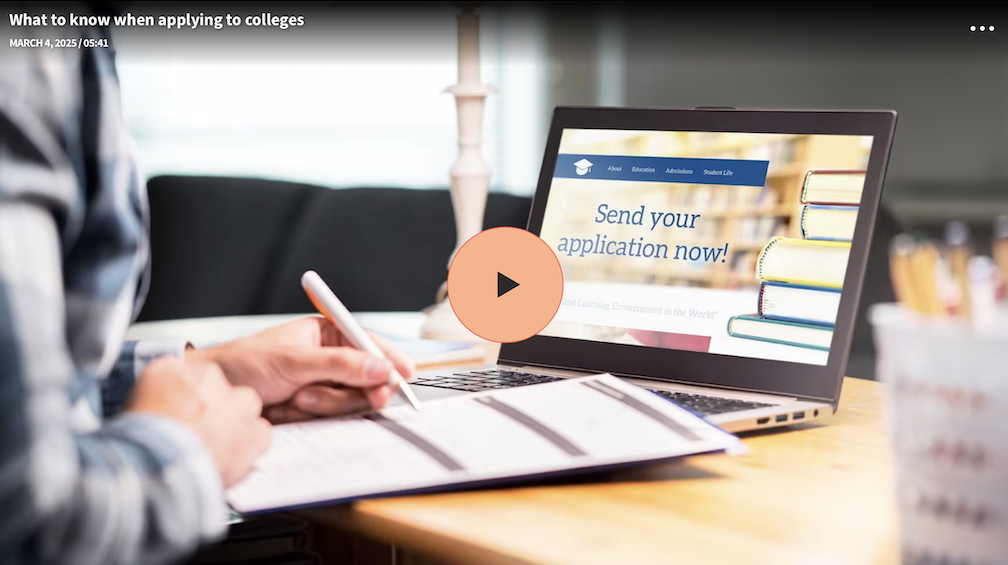High School Counselor Week
Weekly stories, facts, trends, and other information from around the country
March 6, 2025
As Some High Schoolers Fret Over College Costs, These Majors Earn Students $100K
EdSurge – February 27, 2025
EdSurge crunched the newest batch of data from the U.S. Department of Education’s College Scorecard to see how colleges stack up when it comes to earnings, student debt and graduation rates. The figures are based on information from students who received federal aid, whether grants or loans, at public colleges and universities.
Can Colleges Do More to Help Students Succeed?
EdSurge – March 4, 2025
Many high school graduates aren’t college-ready. Many professors have noticed that students struggle more than ever with the jump from high school to college. They don’t know how to ask for help, struggle to complete homework and rarely participate in class. Instead of lowering standards, experts say colleges need to prepare for a new type of student — one who may not have time to complete every reading or attend every study session, but is still valuable and deserving of a quality education.
Trump administration clarifies stance on DEI in schools
K-12 Dive – March 3, 2025
The U.S. Department of Education late last week clarified its stance on diversity, equity and inclusion policies in schools, saying that racial preferences and other forms of diversity and inclusion efforts are indeed allowed in some situations. The Q&A guidance seems to ease the administration’s strict stance on schools’ DEI efforts, which schools had initially feared would limit inclusive programs and practices like student affinity groups, cultural observances and culturally reflective curriculum.
 Ready, Set, Visit: Making the Most of Campus Visits
Ready, Set, Visit: Making the Most of Campus VisitsPost – March 5, 2025
College Advice & Timely Tips with Lee Bierer
School counselors ID ‘critical shortfalls’ in student mental health crisis
eSchool News – March 3, 2025
The majority (94%) of school counselors believe schools cannot address the escalating youth mental health crisis at Tier 3 support levels alone and must adopt proactive, early interventions. A recent survey of 500 U.S. K-12 school counselors exposed critical challenges in addressing the crisis in schools. The data revealed widespread agreement that early, targeted support is essential, and spotlighted the systemic challenges school counselors face, including limited time for student mental health support and personal burnout. 96% of counselors agreed that too many students are being pushed towards Tier 3 interventions when they would be better served through earlier identification and intervention. One survey clinical leader noted, ‘It is clear that Tier 2 interventions are the key…by providing targeted support before students reach a level of crisis, we can foster resilience, improve academic outcomes, and reduce the long-term negative impact on students and families.’
Why counsellors need to know about Project Access
Times Higher Education – March 3, 2025
Project Access is a global, student-led non-profit, dedicated to breaking down barriers to higher education by providing under-represented students with the resources and guidance they need to access certain world-class universities in the US, UK, and EU. The program is free to eligible students who want to study at one of the top universities with which Project Access partners (see the list here). Founded in 2016 in the belief ‘that passion and potential should define a young person’s future,’ not their socio-economic background, Project Access provides mentorship, admissions resources, global outreach, and assistance in understanding financial aid and budgeting. There are several ways for individuals and institutions to get involved, but the simplest is simply to spread the word in our networks, so that low-income and underrepresented students are encouraged to apply for its mentorship programme and aim for one of their dream schools.
What tech-facilitated abuse looks like in teenage relationships
InternetMatters.org – February 28, 2025
Teenagers’ online and offline lives are closely connected, including their intimate relationships. Technology has changed how we connect and communicate, but it can also be used for control and abuse. As part of No More Week 2025, we are breaking the silence on tech-facilitated abuse. This year’s theme, No More Silence, calls on us to shed light on lesser-known methods of control—many of which are enabled by technology.
Your Teen Posted Something Inappropriate Online. Here’s What to Do Next.
Parents – February 27, 2025
Inappropriate social media posts impact both the poster themselves, as well as those on the receiving end. There are also real-world consequences, such as suspension from school and damaged reputations with friends, as well as deteriorating mental health and the indoctrination of potentially harmful ideas. To that end, it’s important your teen understands that what starts online rarely stays there, and what counts as an inappropriate post.
 What to know when applying to colleges
What to know when applying to colleges
March 4, 2025 – Today Show
The anticipation after sending college applications can be exciting and stressful. Robert Franek, editor-in-chief of The Princeton Review, joins TODAY to talk about the process and shares a message to students as they apply to schools.
11 Apps to Help High Schoolers Organize Their College Search
U.S. News & World Report – February 26, 2025
To make the best decision, students need to wisely organize and manage their college search, experts say. Plenty of software is available to help them during the college application process, including some mobile apps that have been around for a while and have staying power. New apps have also launched recently, and although they tend to serve the same function, some are better than others. Here are some apps that college hopefuls may find useful.
How to Prepare for Your Online Degree Program
U.S. News & World Report – February 28, 2025
Before you dive into an online degree program, experts recommend a few steps to prepare for the academic journey you’re about to embark on. Depending on the subject, you should be ready to spend a considerable amount of time studying virtually. An online degree takes another level of dedication because, even with interacting online, there’s a lot of self-discipline involved. Here are five ways experts recommend students prepare.
The Question Every College Applicant Should Ask
Forbes – March 4, 2025
College admission decisions are landing over the next few weeks, and then high school seniors will get to choose where they will enroll. Meanwhile, many 11th graders are beginning their college search, trying to decide how to make sense of all of their options. Hopefully, for all of these students, the weeks ahead will be filled with thoughtful questions, both for themselves and for colleges. There is one question in particular that is not always obvious, but crucial to the experience they will have and to their ultimate success in college: ‘Will I matter?’
How Undocumented Students Can Get College Financial Aid
U.S. News & World Report – March 3, 2025
Undocumented students don’t qualify for Federal aid. However,i n some cases, DACA recipients and other undocumented students can receive scholarships and state aid to pay for college. Funding opportunities vary depending on state residence and immigration status, such as whether a student is a Deferred Action for Childhood Arrivals (DACA) recipient.
What Could Happen if Pell Grant Funds Get Reduced
U.S. News & World Report – March 5, 2025
The Pell Grant program – which awards aid to undergraduate students who demonstrate exceptional financial need – is projected to face a $2.7 billion budget shortfall by the end of the 2025 fiscal year. There’s historically been strong bipartisan support for Pell, since it affects students in every district and every state and it has a broad constituency. There’s also been a push by legislators across the political spectrum for more Pell grants for short-term training programs, which would only increase the shortfall.
Subscribe to our Weekly Emails
March Scholarships Update
sponsored by Fastweb
Top scholarships now open for your High School Students.
How to Know If You’ve Found Your College Fit
Siena College Admissions Blog – March 4, 2025
Choosing the right college is about more than rankings or prestige—it’s about finding a place where you feel comfortable, supported, and excited about your future. But how do you know if you’ve found the right fit? Ask yourself these key questions to help you identify a college that challenges, supports and inspires you:
Supporting Digital Well-being: 12 Ways to Help Teens Unplug from Technology
Boys & Girls Clubs of America – February 6, 2025
Screens aren’t necessarily a bad thing — they’re often a requirement for school or work. They can be portals to learning, discovery and greater connection with people around the world. But excessive screen time can lead to screen addiction and may cause mental health concerns like anxiety, depression, social isolation and difficulty controlling technology use. With a few practical tips, teens, parents and teachers can strike a balance between unplugging and engaging with phones and devices.
Opinion: How Students With Disabilities Will Suffer if the Department of Education is Closed
EdTrust – March 3, 2025
My path to becoming an educator and my experience in the classroom highlights the need for leadership at the federal level. As a former special education teacher, I know that dismantling the Department of Education will exacerbate the teacher shortage and will jeopardize the resources and supports students with disabilities need. By eliminating the agency responsible for distributing funding, protecting students’ civil rights, and holding schools accountable, the administration is ignoring decades of advocacy and telling my students their success is not a priority.
The Schools Reviving Shop Class As a Hedge Against the AI Future
MSN – March 2, 2025
In America’s most surprising cutting-edge classes, students pursue hands-on work with wood, metals and machinery, getting a jump on lucrative old-school careers. School districts around the U.S. are spending tens of millions of dollars to expand and revamp high-school shop classes for the 21st century. They are betting on the future of manual skills overlooked in the digital age, offering vocational-education classes that school officials say give students a broader view of career prospects with or without college. With higher-education costs soaring and white-collar workers under threat by generative AI, the timing couldn’t be better.



